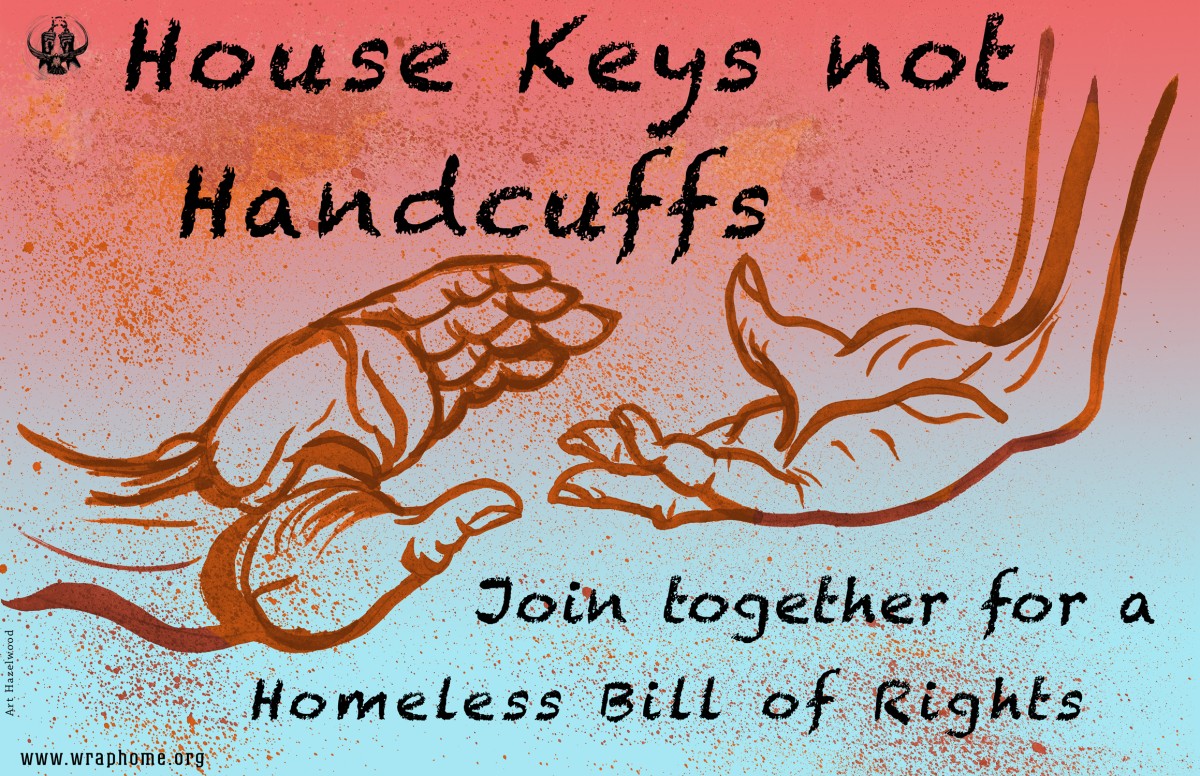At this year’s Conference on Ending Homelessness, Paul Boden from the Western Regional Advocacy Project (WRAP) and Seattle University law professor Sara Rankin presented a workshop called “Homeless Persons’ Bill of Rights.” They shared startling statistics about laws that criminalize homelessness, and talked about movements in a number of states to guarantee civil rights for people who are experiencing poverty. We’re thankful to Sara for contributing this post, which illuminates the issue of criminalization of homelessness and invites our community to help fight it in Washington state. -Denise

Written by Sara Rankin, Seattle University School of Law
Is being homeless a crime? Should it be? These questions are gaining increasing attention, as more and more American cities enact ordinances making it illegal to be homeless. These ordinances not only amount to citywide bans on life-sustaining activities that homeless people need to perform in order to survive, but these laws also condemn homeless people to open hostility and rejection, harassment, and even incarceration— further ensuring a downward spiral.
A recent report by the National Law Center on Homelessness & Poverty found that since 2011:
- Citywide bans on camping in public have increased by 60 percent.
- Citywide bans on begging have increased by 25 percent.
- Citywide bans on loitering, loafing, and vagrancy have increased by 35 percent.
- Citywide bans on sitting or lying down in particular public places have increased by 43 percent; 18 percent of cities now ban sleeping in public.
- Bans on sleeping in vehicles have increased by 119 percent; 42 percent of cities ban sleeping in vehicles.
This surge in criminalizing homelessness is not occurring in a vacuum; indeed, the increasing persecution of homeless people is occurring simultaneously with a national shortage of shelter beds and housing options.

“There is a severe shortage of affordable housing and a lack of emergency shelter options in our communities, leaving homeless people with no choice but to perform basic acts of survival in public spaces,” said Maria Foscarinis, NLCHP’s Executive Director, in a press release. “Such laws threaten the human and constitutional rights of homeless people, impose unnecessary costs on cities, and do nothing to solve the problems they purport to address.”
Washington, and the city of Seattle in particular, has an ominous legacy in the urge to purge homeless people from sight. Katherine Beckett and Steve Herbert’s book, “Banished: The New Social Control In Urban America,” details Seattle’s unfortunate history. But, Washington now has the chance to reverse course.
This September, several Washington homeless rights advocates and service providers are meeting in the first statewide conversation on coordinating efforts to combat the criminalization of homelessness. This first conversation will be facilitated by me and a key player in homeless rights advocacy, Paul Boden from the Western Regional Advocacy Project (WRAP). The meeting will occur on Friday, Sept. 26 at Seattle University’s Student Center Room 210 from noon to 2 p.m. The agenda for this first meeting will largely focus on coordinated data collection efforts. Homeless rights advocates and service providers who are interested in joining can visit this online link for more information and to RSVP: http://wahbor.eventbrite.com.
Washington still has a chance to redeem itself as a leader in human rights. It starts with all of us.
About Sara Rankin
Sara Rankin is Associate Professor of Lawyering Skills at Seattle University School of Law. Her work often focuses on legal and policy issues concerning homeless Americans. She has worked closely with the National Law Center on Homelessness & Poverty, the National Coalition for the Homeless, and other national, regional, and local advocacy groups across the nation on advancing homeless rights. Professor Rankin is particularly interested in the use of legislative and administrative tools to effect social change; she is a frequent commentator on legislative drafting, advocacy, and policymaking issues as a co-editor of the Legislation Law Prof Blog. A graduate of the New York University School of Law and the Harvard Graduate School of Education, she frequently publishes and presents on the social and political aspects of legal education reform, legal issues affecting the homeless, policy making, and legislative drafting and advocacy.
Further reading
• “The Growing Criminalization of Homelessness” from Al Jazeera America
• “The Problem With Criminalizing Homelessness” from ThinkProgress
• “Increasing Number of Laws Target Cities’ Homeless Population” from Scripps Howard Foundation Wire
